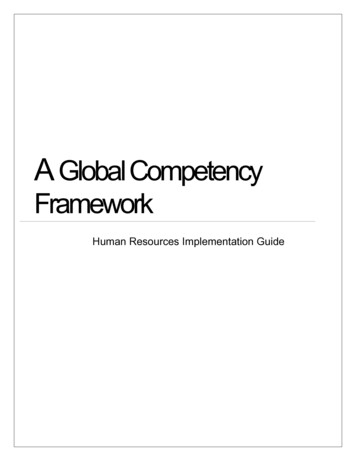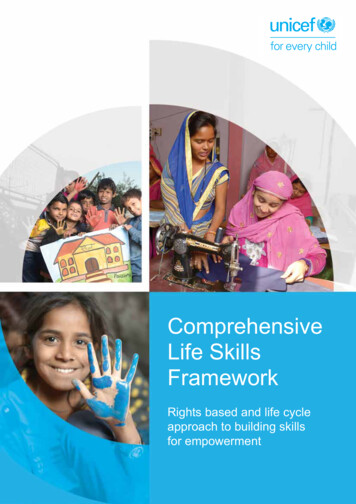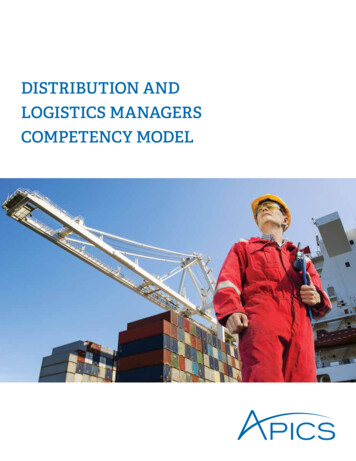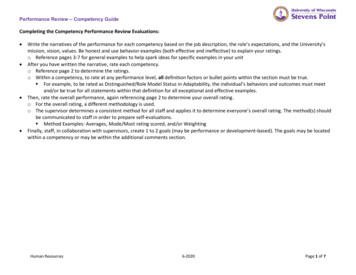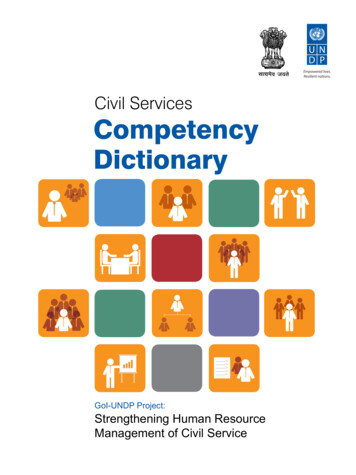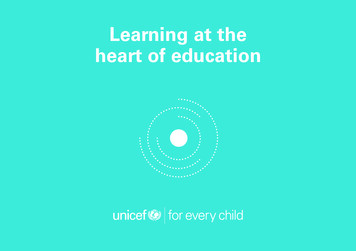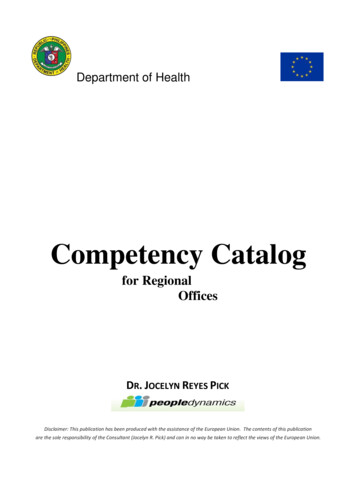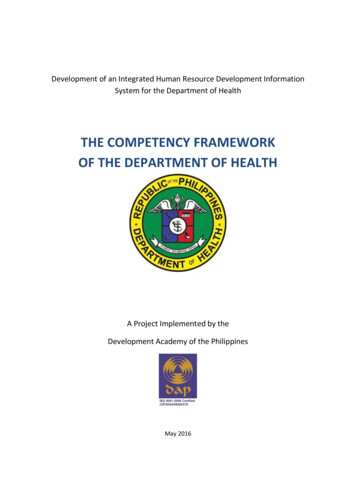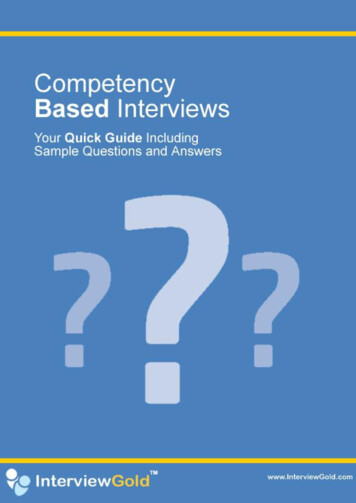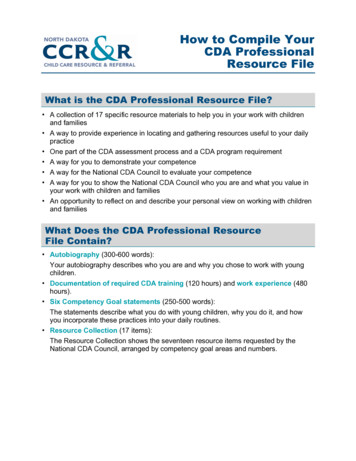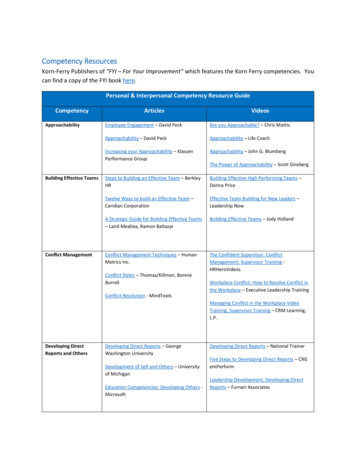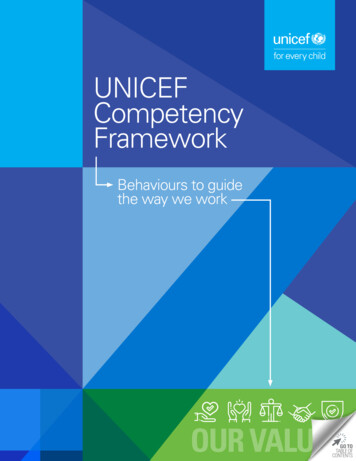
Transcription
UNICEFCompetencyFrameworkBehaviours to guidethe way we out.OUR countabilityGO TOTABLE OFCONTENTS
BACK TOCOVER“Our framework hasbehavioural indicators forevery competency, which makesit much more real, tangible and”a foundation for discussions.Eva MennelDirector, Division of Human Resources
BACK TOCOVERTable of contentsForeword. 01Eight competency areas. 02Values. 03Level descriptions. 03Builds and maintains partnerships. 04Demonstrates self-awareness and ethical awareness. 05Drive to achieve results for impact. 07Innovates and embraces change. 08Manages ambiguity and complexity. 09Thinks and acts strategically. 10Works collaboratively with others. 11Level descriptions:Nurtures, leads and manages people. 12Nurtures, leads and manages people. 13
BACK TOTABLE OFCONTENTSForewordAs we work together to drive change for children and young people acrossthe globe, we must hold ourselves, our colleagues and our organization to thehighest standards.UNICEF’s Competency Framework establishes common standards of behaviourto guide the way we work and is based on our core values of Care, Respect,Integrity, Trust and Accountability.Building from our previous competencies, this updated framework now consistsof eight competencies and a set of behavioural indicators for each. All of ourpeople will be assessed by the framework to varying degrees, depending ontheir job level. We will all be held accountable for our behaviours.We aim to integrate the framework in everything we do, especially in how weattract, develop, assess, and retain our staff. This also includes recognizing andproviding professional development opportunities for staff who embody ourcompetencies and core values in their work.I am excited to champion this framework and call on all UNICEF colleaguesto do the same. Together, let us all demonstrate the highest standards ofbehaviour for the benefit of our workplace culture, our stakeholders and everychild, everywhere.Henrietta H. ForeUNICEF Executive Director
Final CRITA icons, knockout.A icons, knockout.CareBACK TOTABLE OFCONTENTSRespectIntegrityAccountabilityEight competency areasRespectIntegrityTrustAccountabilityOur framework is made up of 8 competency areas.1 to 7 are listed in alphabetical order and 8 is a dedicated people management competency specificallyAccountabilityfor managers and Trust2Demonstratesself-awareness andethical awarenessand4 Innovatesembraces change3Drive to achieveresults for impactambiguity5 Managesand complexityand acts6 Thinksstrategicallyleads and8 Nurtures,manages people71Accountability2Builds and maintainspartnershipsWorks collaborativelywith othersUNICEF Competency Framework Behaviours to guide the way we work
Final CRITA icons, knockout.A icons, knockout.CareBACK TOTABLE ectIntegrityTrustAccountabilityUNICEF’s new values statement is a critical foundation in guiding our decisions and actions. When developingthe competency framework, it was essential that it addressed all five values. The alignment of the valuesAccountabilitywiththe overall framework, with the demonstration of specific behaviours is presented in the diagram ompetencynameDefinitionAccountabilityKey wordsand themesLevelsBehavioursUNICEF ValuesCare, Respect, Integrity,Trust and AccountabilityLevel descriptions*Individual contributor:Level 1: Colleagues without people management responsibility, who are accountable for their ownindividual performance and their contribution to the outputs of the team. Describes the core behavioursrequired of all colleagues across the organization, regardless of contract type, job role or grade level.Team manager:Level 2: Applies to all colleagues who have operational and functional responsibility for a team.Manages individual and team performance.Manager of multiple teams:Level 3: Applies to senior colleagues with responsibility and accountability for multiple teams.The levels are cumulative and all colleagues, regardless of contract type, job role or grade level,are expected to demonstrate the core behaviours outlined in level 1. This means that: Team Managers at level 2 are expected to demonstrate the behaviours outlinedin both levels 1 and 2 and M anagers of Multiple Teams at level 3 are expected to demonstrate the behavioursoutlined in all three levels.The competency area, Nurtures, Leads and Manages People, is an additional competency for managers and leaders with people management responsibilities.The level descriptions are on page 12. 3UNICEF Competency Framework Behaviours to guide the way we work
Final CRITA icons, knockout.A icons, knockout.CareBACK TOTABLE OFCONTENTSRespectIntegrityAccountabilityBuilds and maintains inition: Build a network of external stakeholders and alliances with government counterparts, civilsociety, the media and the private sector, in order to promote and advance the work of the tTrustAccountabilityAccountabilityLevel 1Level 2Level 3Individual contributorTeam managerManager of multiple teamsTHE ABILITY TO:THE ABILITY TO:THE ABILITY TO: Develop a network of formaland informal contacts throughparticipation in professionalnetworks or consultationswith others. Collaborate with other UNentities, public and privatesector partners, sharingknowledge and contributingto best practice. Initiate new partnerships,including with the privatesector and media. Adopt a consultative approachand solicit the support of keystakeholders at critical stagesof one’s work. Advocate, influence andnegotiate reflecting the needsof children, women and youngpeople in discussions with keydecision makers. Act as a role model for UNICEF,strengthening the reputation ofthe organization. Anticipate changing priorities,working with partners to createlong-term and sustainableopportunities. Act as a credible and convincingspokesperson and negotiatorfor UNICEF. Promote and select partnerswho share UNICEF’s values. Ensure that feedback from keystakeholders is incorporatedinto programme design,implementation and teamlearning.4UNICEF Competency Framework Behaviours to guide the way we work
Final CRITA icons, knockout.A icons, knockout.CareBACK TOTABLE OFCONTENTSRespectIntegrityTrustDemonstrates self-awarenessand ethical untabilityDefinition: Self-aware of own strengths, limitations, working style and deeply held convictions and biases.Displays ethical awareness through behaviours that are consistent and compliant with the standards ofconduct for international civil servants, UNICEF’s values and relevant UNICEF policies and procedures.AccountabilityLevel 1Level 2Level 3Individual contributorTeam managerManager of multiple teamsTHE ABILITY TO:THE ABILITY TO:THE ABILITY TO:Self-awarenessSelf-awarenessSelf-awareness Display sensitivity and adjustlanguage and tone, ensuring itis not demeaning or aggressive. Be open and objective tofeedback without beingdefensive or taking retaliatoryactions. Promote the importance ofdemonstrating self- awarenessin driving change to cultureand preventing the abuse ofauthority. Recognize own strengthsand limitations, learning frommistakes made. Seek feedback from multiplesources on own behaviours,including unconscious biasesand potential blind spots. Act onthe feedback received. Be transparent in admittingmistakes and take correctiveaction. Communicate and reinforcebehaviours within the team thatare aligned to UNICEF’s values. Be mindful of the authority andinfluence that comes with therole and prevent the abuse ofauthority.Ethical awareness Recognize personal stress andseek help to maintain personalwell-being. Demonstrate impartialapplication of organizationalpolicies, procedures andpractices.Ethical awareness Respond appropriately toethical issues and complaints ofabuse of authority, bullying orharassment. Display appropriate ethicalbehaviours, refraining fromdiscriminatory* language andactions. Challenge unprofessionaland unethical behaviours bystanding up against actionsthat are not aligned withUNICEF’s values.Ethical awareness Role model and lead byexample in the demonstrationof ethical behaviours. Create and promote a culturethat establishes zero-tolerancefor discriminatory* languageand behaviours. Create and promote a culturethat establishes procedures toaddress unethical behaviours. Take decisive action on ethicaldilemmas. Provide a protectiveenvironment in whichcolleagues can speak upand act without fear.continued on next page.* 5Discriminatory refers to sexist, racist, xenophobic and homophobic, language and behaviours.UNICEF Competency Framework Behaviours to guide the way we work
Final CRITA icons, knockout.A icons, knockout.ttystCareBACK TOTABLE OFCONTENTSRespectIntegrityTrustLevel 1Level 2Level 3Individual contributorTeam managerManager of multiple y Voice opinion in a truthful andrespectful manner. Apply UNICEF’s core values inpersonal and professional life,demonstrating consistencybetween words and actions.Accountability6 Challenge difficult orcontroversial issues anddemonstrate courage inalignment with UNICEF’svalues.UNICEF Competency Framework Behaviours to guide the way we work
Final CRITA icons, knockout.A icons, knockout.CareBACK TOTABLE OFCONTENTSRespectIntegrityAccountabilityDrive to achieve results for n: Commits to action and assumes responsibility and ownership for own performance and theassociated stAccountabilityAccountabilityLevel 1Level 2Level 3Individual contributorTeam managerManager of multiple teamsTHE ABILITY TO:THE ABILITY TO:THE ABILITY TO: Plan and take ownership fordelivering tasks with minimalsupervision. Inspire a sense of purpose,providing vision and directionto guide the team to achievethe desired impact. Act as a role model, creatingand promoting a performanceculture where colleagues havea strong sense of accountabilityand fulfilment. Pay attention to detail,producing work of a highstandard. Monitor activities on a regularbasis, reviewing work plan toensure progress and delivery. Ensure coherence in theactivities of the team,communicating strategicpriorities and setting cleardeliverables. Ensure the completion of tasks,while addressing obstacles andbottlenecks. Undertake team progressreviews, discussing and takingcorrective measures. Take responsibility forconsequences of decisions andfailures without passing blameto others. Predict possible roadblocksin achieving results whileproviding guidance and support. Involve key stakeholders inactivities that impact them,keeping them informed ofpotential delays and problems.7 Promote an environmentwhere team members learnfrom individual and collectivesuccesses and mistakes. Promote a culture of focus onthe needs of key stakeholdersin the delivery of results. Create an environment ofperformance measurement,seeking feedback fromkey stakeholders to assesseffectiveness. Take full responsibility andaccountability for the teams’shortcomings, providing supportin areas requiring development. Promote the prioritization ofproject/programme deliverableswith team managers to ensureclarity and focus.UNICEF Competency Framework Behaviours to guide the way we work
Final CRITA icons, knockout.A icons, knockout.CareBACK TOTABLE OFCONTENTSRespectIntegrityAccountabilityInnovates and embraces n: Is open to and proposes new approaches and ideas. Adapts and responds positively to AccountabilityAccountabilityLevel 1Level 2Level 3Individual contributorTeam managerManager of multiple teamsTHE ABILITY TO:THE ABILITY TO:THE ABILITY TO: Review work practices,analysing evidence-basedtrends to apply new methodsand techniques. Encourage innovation andpromote the importance ofteam members engaging inchange initiatives. L ead and champion changeinitiatives, mobilizing teams torespond to changing priorities. Respond flexibly to changingcircumstances, priorities anddeadlines. Communicate and keepcolleagues motivated duringtimes of uncertainty andchange. Display creativity, experimentwith new approaches anddemonstrate openness tochanging existing practices. Involve the team and awide range of stakeholdersin generating ideas,recommendations andsolutions. Recognize innovative thinking,creativity and calculated risktaking.8 P romote an environment thatdrives creativity, innovation,flexibility and responsiveness. P romote a culture supportiveof challenges to the status quo,while maintaining rigor in theevaluation of new ideas. C reate and promote a cultureencouraging the sharing ofsuccess and failure to promoteindividual and collectivelearning.UNICEF Competency Framework Behaviours to guide the way we work
Final CRITA icons, knockout.A icons, knockout.CareBACK TOTABLE OFCONTENTSRespectIntegrityAccountabilityManages ambiguity and ition: Demonstrate resilience and composure, get things done despite challenges and maintainperformance levels in pressured, adverse and uncertain tTrustAccountabilityAccountabilityLevel 1Level 2Level 3Individual contributorTeam managerManager of multiple teamsTHE ABILITY TO:THE ABILITY TO:THE ABILITY TO: Maintain focus on prioritiesand deliverables, in the face ofpressure, or when things do notgo according to plan. Anticipate obstacles, adaptteam priorities, developalternative plans and solutionsin consultation with the team. Demonstrate flexibility,developing alternate plans inrapidly changing situations,uncertainty and adversity. Maintain team effectivenessand morale when dealingwith changing priorities orambiguous situations. Promote and maintain apositive work atmosphere,supporting teams to remainproductive and achieve resultsdespite operating in a complexenvironment. Analyse and exercise judgmentin challenging situations in theabsence of specific guidance. Manage the impact of complexand uncertain environmentson programming activity andcolleagues’ well-being. Manage personal frustrations toavoid potential conflict. Identify key issues andpriorities, maintaining personaleffectiveness in complexsituations.9 Provide stability in the face ofconflicting external pressures,tensions and opposition fromstakeholders. Promote organizationalresilience by communicatingopenly and honestly aboutchallenges and the actionsrequired to address them.UNICEF Competency Framework Behaviours to guide the way we work
Final CRITA icons, knockout.A icons, knockout.CareBACK TOTABLE OFCONTENTSRespectTrustAccountabilityThinks and acts finition: Understands the big picture and is able to identify potential opportunities for action andchallenges that exist. Forms sound evidence-based judgements in the delivery of UNICEF’s grityAccountabilityAccountabilityLevel 1Level 2Level 3Individual contributorTeam managerManager of multiple teamsTHE ABILITY TO:THE ABILITY TO:THE ABILITY TO: Understand the organization’sobjectives and align work planactivities. Clarify and shape the team’srole and purpose in deliveringUNICEF’s priorities. Keep theteam informed and provideguidance. P romote collaboration with keystakeholders, openly sharingknowledge, insights andeffective practices. Analyse and evaluate datafrom a wide range of sources,assessing reliability andpresenting conclusions toenable informed decisionmaking. Adapt workplans in responseto emerging situations andnew requirements. Consider the long-term impactand risks of decisions andactions. Solicit the views andperspectives of teammembers when developingrecommendations. E ncourage and create a cultureof involving key stakeholdersin making critical organizationwide recommendations anddecisions. Facilitate engagement withother teams and stakeholdersin addressing priorities andstrategies. C reate an environment ofevidence-based analysis, riskmanagement, prioritization andtimely decision-making. Take responsibility for teamdecisions, providing therationale as appropriate. S can the external environmentto explore new/emerging areasand identify opportunities andinitiatives.10 UNICEF Competency Framework Behaviours to guide the way we work
Final CRITA icons, knockout.A icons, knockout.CareBACK TOTABLE OFCONTENTSRespectTrustAccountabilityWorks collaboratively with n: Establish and maintain mutually supportive working relationships, demonstrating sensitivity topeople of diverse backgrounds, respecting differences and ensuring that all can contribute and grityAccountabilityAccountabilityLevel 1Level 2Level 3Individual contributorTeam managerManager of multiple teamsTHE ABILITY TO:THE ABILITY TO:THE ABILITY TO: Challenge colleaguesrespectfully when views andopinions differ. Seek the input of teammembers, ensuring the voicesof diverse groups are heard,and involving them indecisions that affect them. P romote a culture that valuesdiverse opinions, with inputfrom all colleagues, regardlessof hierarchy. Encourage others to contributeideas and listen withoutinterruption. Support colleagues in achievingtheir goals. Earn the trust and confidence ofcolleagues through respectful,honest behaviours, displayingopenness and tolerance. Seek the input of internalstakeholders, gaining buy-inand commitment while sharingrelevant information. Address issues, conflicts andmisunderstandings betweenself and others. Acknowledge conflict anddisagreement in the team andwork to facilitate resolutionas appropriate. Encourage proactivecollaboration with other teams,acknowledging contributionsand ideas. Keep the team informed aboutdecisions and, as appropriate,explain the rationale behindthese. P romote empowering workingenvironments, ensuring dignityand respect for all colleagues,while holding team managersaccountable. P romote a collaborative workingculture based on participatoryapproaches to eliminate silos. P romote a culture wherecolleagues and teams haveopportunities to learn fromconflict and disagreement.11 UNICEF Competency Framework Behaviours to guide the way we work
Final CRITA icons, knockout.A icons, knockout.CareBACK TOTABLE OFCONTENTSRespectIntegrityAccountabilityLevel descriptionsNurtures, leads and manages e competency area, Nurtures, leads and manages people, is an additional competency formanagers and leaders with people management responsibilities.People manager:AccountabilityLevel 1: Applies to all colleagues who have people management responsibility for 1 or 2 employees.Manages individual performance.Team manager:Level 2: Applies to all colleagues who have operational and functional responsibility for a team.Manages individual and team performance.Manager of multiple teams:Level 3: Applies to senior colleagues with responsibility and accountability for multiple teams.The levels are cumulative and all colleagues, regardless of contract type, job role or grade level,are expected to demonstrate the core behaviours outlined in level 1. This means that: Team Managers at level 2 are expected to demonstrate the behaviours outlinedin both levels 1 and 2 and M anagers of Multiple Teams at level 3 are expected to demonstrate the behavioursoutlined in all three levels.12 UNICEF Competency Framework Behaviours to guide the way we work
Final CRITA icons, knockout.A icons, knockout.CareBACK TOTABLE OFCONTENTSRespectTrustAccountabilityNurtures, leads and manages n: Provide exemplary management and leadership, motivating and developing colleagues toperform at their best, while building diverse and inclusive ityAccountabilityAccountabilityLevel 1Level 2Level 3People managerTeam managerManager of multiple teamsTHE ABILITY TO:THE ABILITY TO:THE ABILITY TO: Delegate responsibility andauthority, while fairly allocatingtasks, clarifying expectationsand providing clear directionand guidance. Provide team managerswith the needed direction toachieve results and hold themaccountable. Create and promote anenvironment where colleaguescan voice their concernswithout fear. Create inclusive teams,reflective of the diverse natureof the UNICEF workforce. Role model effective peoplemanagement behaviours,emphasising their importanceto team managers and holdingthem accountable. Support colleagues indeveloping realistic work plansbased on programmatic needs. Regularly discuss performance,giving timely, constructivefeedback, providing supportto address issues and takingaction when necessary. Identify learning goals forcolleagues, providing guidanceon how to achieve themand ensure a supportiveenvironment for professionaland personal development. Support career developmentopportunities for colleagues,devoting time to coach, mentorand build confidence to achievepersonal and career goals. Recognize individualcontribution and acknowledgeteam success. Create opportunities forall colleagues to be heardand facilitate constructivediscussions. Dedicate time and energy tothe well-being of colleagues,monitoring emotional reactionsand their ability to adjust tochallenging circumstances. Support direct reports todevelop their leadershipcapabilities, providinghonest feedback about theirperformance and ensuringrelevant support. Create and promote a cultureof fairness, transparency andinclusion where colleaguesfrom all backgrounds andperspectives feel empoweredand valued. Promote a culture ofcontinuous learning andknowledge sharing within andamongst teams. Create an environment whereteam managers promote androle model employee well-beingand self-care.13 UNICEF Competency Framework Behaviours to guide the way we work
BACK TOCOVER
Recognize personal stress and seek help to maintain personal well-being. Ethical awareness Display appropriate ethical behaviours, refraining from discriminatory* language and actions. Challenge unprofessional and unethical behaviours by standing up against actions that are not aligned with UNICEF's values. Level 1 THE ABILITY TO:
